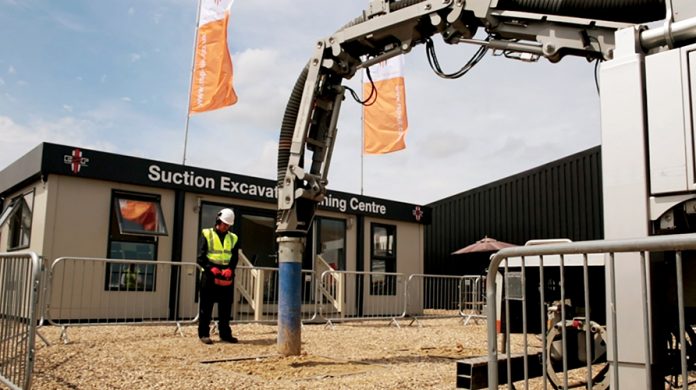The gas industry has seen the benefits of suction excavation for over 10 years, but the water industry is just touching the surface, as HELEN COMPSON discovers.
Husband and wife team Lloyd and Charlie Gardener nailed their colours to the mast four years ago, when they founded RSP UK Suction Excavators Ltd.
Lloyd, an electro-mechanical engineer by trade, certainly recognised a good thing when he saw it. The argument for this particular form of trenchless technology is a no-brainer, he said.
“Lane closures and the working time needed on site are big considerations for utility companies and contractors. But imagine if all you need to cut is a 650mm diameter surface hole, use the suction excavator to remove the material around the services with no damage or strikes.
Well, that is what suction excavators offer.”
The advantages of suction excavation are undeniable. The controversial method of digging up freshly-laid road surfaces is averted. The effects on traffic are minimised. The excavated material is used for reinstatement and the size of the excavation site is such that the supporting capabilities of the soil and road surface are not compromised.
The key message the Gardeners want to get across is just how much these tailor-made, cutting edge excavators save companies in terms of time, money and safety considerations.
“A job that used to take five days now takes just half-a-day,” said Lloyd. “There are huge cost reductions to be had.”
A testimonial from one purchaser of RSP UK’s German-made machines, contractor Clancy Docwra, which works for Anglian Water, reads: ‘As well as saving time, the non-destructive suction excavation process enhances safety by minimising the risk of accidental strikes on buried utilities and service infrastructure.
‘The use of the machines enables Clancy Docwra and Anglian Water to dispatch eight fewer team members to each job site, freeing up operatives to carry out other valuable work elsewhere.’
Lloyd cites the example of Cadent too. The operator of the largest natural gas distribution network in the UK, it has its own fleet of more than 60 suction excavators. “They have heavily invested in the technology in the past 10 years and are continuing to do so,” he said.
“Water companies and contractors are beginning to see the benefits. There has been huge progress over the past three years within the water industry, but there is certainly more work to be done on building awareness of suction excavation technology.”
The Gardeners are doing their part. Having launched RSP UK as a direct subsidiary of RSP Germany in 2016, they have since established a training and testing centre that acts as a hub for customers and operators to learn and qualify in using their suction excavator in the correct and safe way.
Charlie says: “This is a family business and as such, we pride ourselves on the personal service and the close attention to detail we offer.
“Our vehicles are tailor-made, designed to an individual customer’s specifications, and we collaborate with them closely. They will have the same point of contact throughout – speaking to the same member of our team each time.”
But the note Lloyd ends on addresses the most important aspect of all. Safety.
The training and testing centre, established in 2019, provides training and live testing not only for those doing the purchasing but also for those destined to actually use the equipment.
Lloyd said: “We are very serious about raising the industry standard and encourage all owners to invest in training and testing, to ensure the best use of the excavators and to establish the correct safety standards for their teams.
“We were delighted when NOCN approved us a Construction Part Competence Scheme Test Centre and we believe in CPCS and EUSR becoming the construction & utilities industry’s preferred accreditation.
“I am also proud to be a member of the Suction and Vacuum Excavation board, which is laying strong foundations for the future of our industry.”
www.rsp-uk.co.uk



